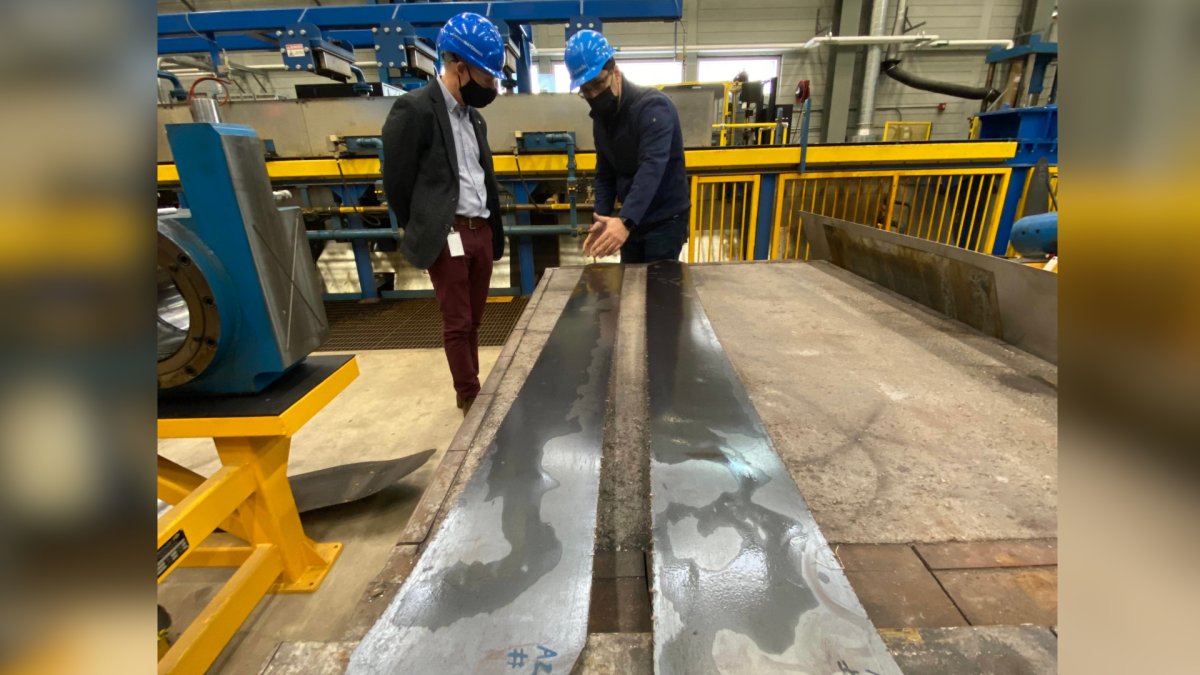A Hamilton laboratory is helping preserve a piece of history from the Second World War by making medals from parts of a legendary ship destroyed during the attack on Pearl Harbor.

Steel from the USS Arizona, a battleship sunk during the 1941 assault in Hawaii, is the source material for the USS Arizona Medal of Freedom – commemorating those who lost their lives the morning of Dec. 7, 1941.
“We were approached about two months ago by a foundation called the Lauren F. Bruner USS Arizona Memorial Foundation asking if we could roll a small quantity of steel that had been salvaged from USS Arizona which they would then use in making memorial medals,” Philippe Dauphin, director general at CanmetMATERIALS (CMAT) told 900 CHML’s Good Morning Hamilton.
The surprise military strike by the Imperial Japanese Navy Air Service killed 1,177 of 1,512 of the Arizona crewmembers – including five Canadians. A neutral country at the time, the attack led to the United States’ formal entry into the war the next day.
One of the survivors, Lauren Bruner, established a nonprofit foundation to honour all those who were aboard the ship on the morning of the attack.
“When I looked at my calendar, I figured hey, if we do things right, we could actually do the rolling on the same day that the attack occurred,” Dauphin said.
CMAT, operated by Natural Resources Canada (NRCan), is rolling steel from the USS Arizona – which has been submerged in Pearl Harbor for the last 80 years.
The process began when a mill in Alabama melted the steel to create four ingots which are now being rolled down to sheets by CMAT.
Dauphin says the ingots will be heated up to 1,100 C, which will take hours, while the actual rolling into sheets will take only about two minutes through six passes.
“So it goes back and forth between the rolls being thinner each time,” said Dauphin.
“Then we bring it to a quenching table where it is cooled rapidly.”
The USS Arizona Medal of Freedom is cut from metal sheets made at a Hamilton, Ont. facility near McMaster Innovation Park.The end result is a sample about the size of a legal sheet of paper about an inch and a half in thickness.
Medals will then be laser-cut from these sheets by another mill.
CMAT lab got the gig when Bruner Foundation was advised by a prof at the University of Missouri to look at the facility which was one of the few places that had a “pilot scale rolling mill” that can be configured to roll hot steel or cold metal at room temperature.
It also has the capability of testing different rolling methods without having to shut down an entire operation to test out a single strip, which is necessary at most mills.

The medals cut from the steel are expected to be a little bit bigger than a toonie and in the shape of a shield with a stylized A for Arizona.
Dauphin said he didn’t know how many medals will be made from the sheets, but said the amount CMAT is making could accommodate between 1,000 and 2,000.
“It should be a lot. We are expected to roll about a total of about 300 pounds or 140 kilos of that steel,” Dauphin said.
‘Each one and a half inch thick piece of steel turns out to be about a 10-foot strip of steel.”
CMAT, located inside McMaster Innovation Park on Longwood Road South, is the largest research centre in Canada dedicated to fabricating, processing and evaluating metals and materials.
Two plants, in Hamilton and Calgary, research and develop material solutions for industry in the energy, transportation and metal-manufacturing sectors.





Comments